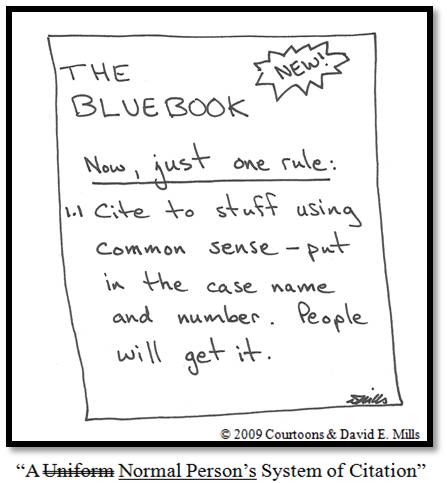Because Law Review is a major commitment, we're not going to tell you to join just because it looks good on your resume. But there are many other reasons why. Because lists are in fashion, here's our list:
(1) You'll get a chance to bond with the nerdiest people you'll ever meet. Seriously.
They're not Katy Perry in disguise, and
don't have braces, but they're your
kind of people. Trust us.
Do you enjoy debating about arcane statutes and looking up whether Congress really intended the courts to read a law certain way? Are you in love with the Harvard Bluebook and are just dying to tell somebody about how you love rule 18.2.2? You'll fit right in.
When you're part of a law review staff, you'll be working as part of a cohesive team with one purpose: get that sucker published. You might be sent off to the law library to verify citations, get copies of original sources, or otherwise find something to help you figure out what Professor Iwonanobelprize is actually saying in his 200 page article. Other times you might be editing the articles themselves for content, citations, or making sure there is no accidental plagiarism. Throughout this ordeal, you'll be bonding with dedicated, intelligent, and very nerdy people. Trust us, you'll make friends.
(2) Citations are no longer scary.
If only wishing made it so.
As a 1L, you likely encountered legal citations for the first time in your legal writing class. Maybe you even had to take a citation exam. Unfortunately, your legal writing class probably did not give you enough exposure to citations to make you feel like an expert. In fact, if your legal writing class was like ours, it made you dread the very thought of having to cite at all.
As a member of the Law Review staff, you'll be dealing with legal citations, and especially the Harvard Bluebook, all the time, because you'll be editing the works of other writers and creating your own articles. The Bluebook is the gold standard for citations, if only for the reason that it has the word "Harvard" in front of its name.
The Bluebook is definitely confusing at first, but after you've been assigned to fix 120 citations in Professor Ohnoheusedthewrongformat's piece on the Confluence of Admiralty Law and Trade Secrets, you'll start to get the hang of things. You'll start to recognize patterns of error. You'll see the importance of signals like see, e.g., cf. and especially see generally. Finally, when you start that summer associate position or externship, you'll be able to handle citation questions confidently and see, with horror, how professional attorneys cannot.
(3) Your writing gets better.
Among other things.
If you're thinking about Law Review, you probably consider yourself a strong writer already. There's no doubt you are, after all you would not have got into law school without demonstrating at least some capacity to write. But you may have noticed that your normal law school classes don't give you a lot of opportunities to flex those skills. Most of the assignments involve reading and then discussion in class, not research papers or other written assignments.
Law Review allows you to keep those skills fresh and learn new ones. Maybe, like us, you manage to go through all of college without figuring out how to conquer, much less identify, the passive voice. as a Law Review staffer, you'll be charged with editing someone's article for grammar. You likely be working with a style manual such as the Little Brown Handbook (affectionately known as the LBH) or the Chicago Style Manual, which will help you identify grammar errors. The more you edit, the more you'll see issues with your own writing that you can fix and improve. These skills will also translate into the workplace, and you'll produce better, more concise, and more effective professional work as a result.
(4) You'll be part of something bigger than yourself.
Law Review may sometimes seem like it's eating your life, the universe, and everything.
But you're creating something great.
When you're part of the Law Review staff, you'll be making something long-lasting: a document that will help attorneys, judges, professors, and other students better understand the law and how it affects us. This is a document that, if produced with the proper care and professionalism, will enhance both your reputation and your school's.
Think about it for a second. Law reviews are student run, for the most part. This endeavor is not like a journalism class where your teacher directed the assignments and you produced results. Here, the quality of the articles published depend entirely on the student staff. From the beginning, you'll be an integral part in the publication process. If you're given the opportunity to write your own article, you'll be able to help shape the debate on how the law develops. Finally, should you pursue a leadership position, you'll be able to help set the policy of the Law Review and help direct students and professors with their own quest in writing about the law.
Getting onto Law Review isn't easy and you need to have the patience and time management skills to juggle your Law Review assignments with normal classes, but those are topics for another day. But if you're academically skilled, have a desire to learn, and want to make a lasting impression on the law, Law Review is for you.




My best friend just started the law school and she is struggling so much i would share your blog with her, hopefully it will help her cope up with the stress.
ReplyDeleteI’ve been searching for some decent stuff on the subject and haven't had any luck up until this point, You just got a new biggest fan!.. Detroit
ReplyDeleteAn exceptionally complex method for composing, making impacts particularly in dialect and writing.
ReplyDeletepersonal injury attorney Los Angeles